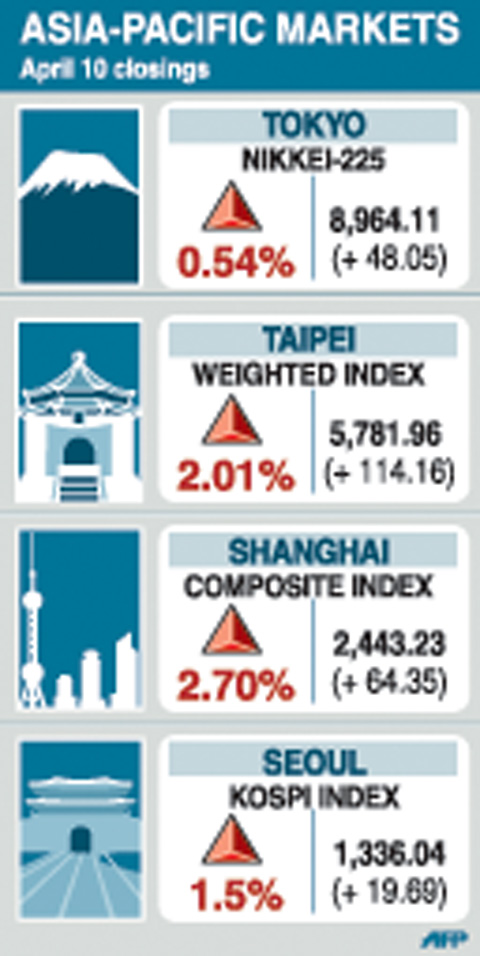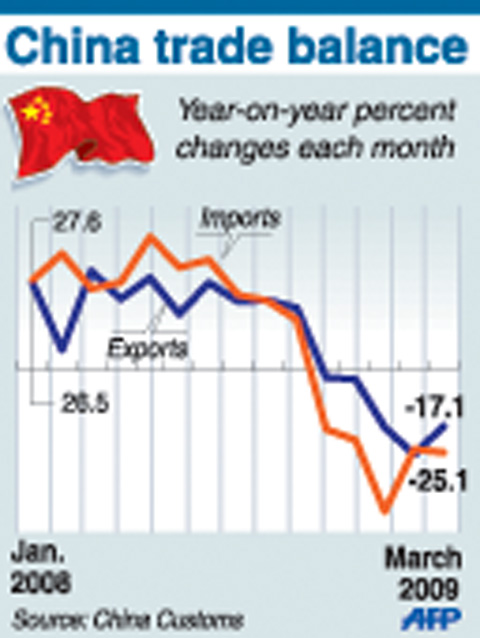Asian stocks climbed for a fifth week, the longest streak of gains since February 2007, as Japan proposed a US$154 billion stimulus package and investors speculated the global recession is abating.
Orix Corp, Japan’s largest non-bank financial company, rallied 26 percent as Japan’s Prime Minister Taro Aso said he envisioned a stimulus package that would create 2 million jobs.
AU Optronics Corp (友達光電), the world’s third-biggest maker of liquid-crystal displays, climbed 12 percent as panel shipments jumped. Mazda Motor Corp, Japan’s second-largest car exporter, surged 33 percent, aided by the yen’s fall to a five-month low.

The MSCI Asia-Pacific Index climbed 1.5 percent this week to 87.97, the highest since Jan 12. Asian markets joined global stocks in a fifth weekly advance, lifting the MSCI benchmark from a six-year low.
“Spring has finally come to the market,” said Yoshihiro Ito, senior strategist at Okasan Asset Management Co, which oversees about US$9.3 billion. “We’ve seen indicators that suggest the economy is bottoming out. People’s view on the economic outlook is gradually turning optimistic and this is leading to the rebound in the equity market.”
Japan’s Nikkei 225 Stock Average gained 2.5 percent. South Korea’s KOSPI index added 4.1 percent as the strengthening won eased the foreign currency debt burden of lenders, including Woori Finance Holdings Co. India’s SENSEX added 4.4 percent amid easing inflation.

China’s central bank said yesterday that its foreign exchange reserves rose 16 percent from a year earlier to US$1.95 trillion by the end of last month, but growth slowed in the first quarter as exports and foreign investment slumped.
China’s reserves, already the world’s largest, increased by US$7.7 billion in the first quarter — US$146.2 billion less than during the same period last year, the People’s Bank of China said in a notice on its Web site.
The rise compared with a fourth-quarter increase of almost US$45 billion, Xinhua reported.
Nearly half of China’s foreign exchange reserves are invested in US treasuries and notes issued by other government-affiliated agencies. Chinese Premier Wen Jiabao (溫家寶) called on the US last month to safeguard those assets as America’s largest creditor.
The reserves last month increased by US$41.7 billion — US$6.7 billion more than the same period last year.
Exports fell 17 percent last month from a year earlier, the fifth straight monthly decline, but less severe than February’s 25.7 plunge, the sharpest in a decade, the customs agency reported on Friday. It said trade “showed clear signs of improvement.”
Imports fell by 25.7 percent, widening the Chinese trade surplus to US$18.6 billion from February’s US$4.8 billion gap.
Taiwanese share prices are expected to turn volatile next week as dealers look to the US corporate earnings season, which may dictate Wall Street’s movements, dealers said on Friday.
It remains to be seen whether foreign institutional investors will continue their buying after a strong market showing this week as it seems to be time for them to adjust their portfolios, they added.
While technical hurdles may cap market upside or even pull the index down next week, high liquidity in the market is expected to prevent it from falling below 5,500 any time soon, dealers said.
Stiff technical resistance is expected at around 5,900 points.
For the week to Friday, the weighted index rose 252.33 points or 4.56 percent to 5,781.96 after a 2.58 percent increase a week earlier.
Average daily turnover stood at NT$144.05 billion (US$4.26 billion), compared with NT$122.78 billion a week ago.
“The local bourse has made eye-popping gains in the recent weeks, outperforming regional markets,” Grand Cathay Securities Corp (大華證券) analyst Allen Lin said.
Since the beginning of last month, the weighted index has risen almost 27 percent.
Markets in Australia, Hong Kong, India, Indonesia, New Zealand, the Philippines and Singapore were closed for public holidays on Friday.

A Chinese freighter that allegedly snapped an undersea cable linking Taiwan proper to Penghu County is suspected of being owned by a Chinese state-run company and had docked at the ports of Kaohsiung and Keelung for three months using different names. On Tuesday last week, the Togo-flagged freighter Hong Tai 58 (宏泰58號) and its Chinese crew were detained after the Taipei-Penghu No. 3 submarine cable was severed. When the Coast Guard Administration (CGA) first attempted to detain the ship on grounds of possible sabotage, its crew said the ship’s name was Hong Tai 168, although the Automatic Identification System (AIS)

An Akizuki-class destroyer last month made the first-ever solo transit of a Japan Maritime Self-Defense Force ship through the Taiwan Strait, Japanese government officials with knowledge of the matter said yesterday. The JS Akizuki carried out a north-to-south transit through the Taiwan Strait on Feb. 5 as it sailed to the South China Sea to participate in a joint exercise with US, Australian and Philippine forces that day. The Japanese destroyer JS Sazanami in September last year made the Japan Maritime Self-Defense Force’s first-ever transit through the Taiwan Strait, but it was joined by vessels from New Zealand and Australia,

SECURITY: The purpose for giving Hong Kong and Macau residents more lenient paths to permanent residency no longer applies due to China’s policies, a source said The government is considering removing an optional path to citizenship for residents from Hong Kong and Macau, and lengthening the terms for permanent residence eligibility, a source said yesterday. In a bid to prevent the Chinese Communist Party (CCP) from infiltrating Taiwan through immigration from Hong Kong and Macau, the government could amend immigration laws for residents of the territories who currently receive preferential treatment, an official familiar with the matter speaking on condition of anonymity said. The move was part of “national security-related legislative reform,” they added. Under the amendments, arrivals from the Chinese territories would have to reside in Taiwan for

CRITICAL MOVE: TSMC’s plan to invest another US$100 billion in US chipmaking would boost Taiwan’s competitive edge in the global market, the premier said The government would ensure that the most advanced chipmaking technology stays in Taiwan while assisting Taiwan Semiconductor Manufacturing Co (TSMC, 台積電) in investing overseas, the Presidential Office said yesterday. The statement follows a joint announcement by the world’s largest contract chipmaker and US President Donald Trump on Monday that TSMC would invest an additional US$100 billion over the next four years to expand its semiconductor manufacturing operations in the US, which would include construction of three new chip fabrication plants, two advanced packaging facilities, and a research and development center. The government knew about the deal in advance and would assist, Presidential